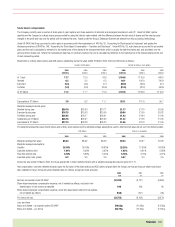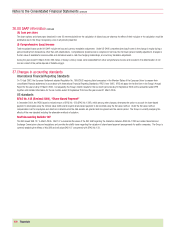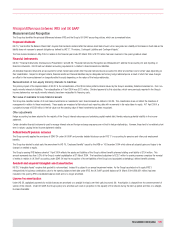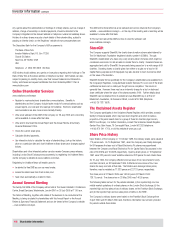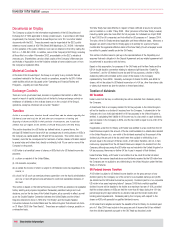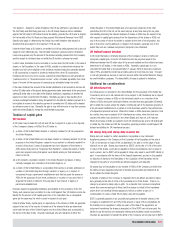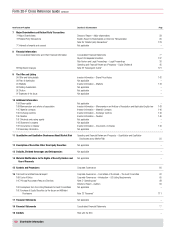Vodafone 2005 Annual Report Download - page 147
Download and view the complete annual report
Please find page 147 of the 2005 Vodafone annual report below. You can navigate through the pages in the report by either clicking on the pages listed below, or by using the keyword search tool below to find specific information within the annual report.
Shareholder information |145
amount specified by the shareholders and free of the restriction in Section 89. In
accordance with institutional investor guidelines, the amount of relevant securities to be
fixed by shareholders is normally restricted to one third of the existing issued ordinary
share capital, and the amount of equity securities to be issued for cash other than in
connection with a rights issue is restricted to 5% of the existing issued ordinary share
capital.
Variation of rights
If, at any time, the Company’s share capital is divided into different classes of shares,
the rights attached to any class may be varied, subject to the provisions of the
Companies Act, either with the consent in writing of the holders of three fourths in
nominal value of the shares of that class or upon the adoption of an extraordinary
resolution passed at a separate meeting of the holders of the shares of that class.
At every such separate meeting, all of the provisions of the Articles of Association
relating to proceedings at a general meeting apply, except that (a) the quorum is to be
the number of persons (which must be at least two) who hold or represent by proxy not
less than one-third in nominal value of the issued shares of the class or, if such
quorum is not present on an adjourned meeting, one person who holds shares of the
class regardless of the number of shares he holds, (b) any person present in person or
by proxy may demand a poll, and (c) each shareholder will have one vote per share
held in that particular class in the event a poll is taken.
Class rights are deemed not to have been varied by the creation or issue of new shares
ranking equally with or subsequent to that class of shares in sharing in profits or assets
of the Company or by a redemption or repurchase of the shares by the Company.
Limitations on voting and shareholding
There are no limitations imposed by English law or the Company’s Articles of
Association on the right of non-residents or foreign persons to hold or vote the
Company’s shares other than those limitations that would generally apply to all of the
shareholders.
Disclosure of interests in the Company’s shares
There are no provisions in the Articles of Association whereby persons acquiring,
holding or disposing of a certain percentage of the Company’s shares are required to
make disclosure of their ownership percentage, although such requirements exist
under the Companies Act.
The basic disclosure requirement under Sections 198 to 211 of the Companies Act
imposes upon a person interested in the shares of the Company a statutory obligation
to provide written notification to the Company, including certain details as set out in the
Companies Act, where:
(a) he acquires (or becomes aware that he has acquired) or ceases to have (or
becomes aware that he has ceased to have) an interest in shares comprising any
class of the Company’s issued and voting share capital; and
(b) as a result, EITHER he obtains, or ceases to have:
(i) a “material interest”in 3%, or more; or
(ii) an aggregate interest (whether “material”or not) in 10%, or more of the
Company’s voting capital; or
(iii) the percentage of his interest in the Company’s voting capital remains above
the relevant level and changes by a whole percentage point.
A “material interest”means, broadly, any beneficial interest (including those of a
spouse or a child or a step-child (under the age of 18), those of a company which is
accustomed to act in accordance with the relevant person’s instructions or in which
one third or more of the votes are controlled by such person and certain other interests
set out in the Companies Act) other than those of an investment manager or an
operator of a unit trust/recognised scheme/collective investment scheme/open-ended
investment company.
Sections 204 to 206 of the Companies Act set out particular rules of disclosure where
two or more parties (each a “concert party”) have entered into an agreement to acquire
interests in shares of a public company, and the agreement imposes
obligations/restrictions on any concert party with respect to the use, retention or
disposal of the shares in the company and an acquisition of shares by a concert party
pursuant to the agreement has taken place.
Under Section 212 of the Companies Act, the Company may by notice in writing
require a person that the Company knows or has reasonable cause to believe is or was
during the preceding three years interested in the Company’s shares to indicate
whether or not that is correct and, if that person does or did hold an interest in the
Company’s shares, to provide certain information as set out in the Companies Act.
Sections 324 to 329 of the Companies Act further deal with the disclosure by persons
(and certain members of their families) of interests in shares or debentures of the
companies of which they are directors and certain associated companies.
There are additional disclosure obligations under Rule 3 of the Substantial Acquisitions
Rules where a person acquires 15% or more of the voting rights of a listed company or
when an acquisition increases his holding of shares or rights over shares so as to
increase his voting rights beyond that level by a whole percentage point. Notification in
this case should be to the Company, the Panel on Takeovers and Mergers and the UK
Listing Authority through one of its approved regulatory information services no later
than 12 noon on the business day following the date of the acquisition.
The City Code on Takeovers and Mergers also contains strict disclosure requirements
on all parties to a takeover with regard to dealings in the securities of an offeror or
offeree company and also on their respective associates during the course of an offer
period.
General meetings and notices
Annual general meetings are held at such times and place as determined by the
directors of the Company. The directors may also, when they think fit, convene an
extraordinary general meeting of the Company. Extraordinary general meetings may
also be convened on requisition as provided by the Companies Act.
An annual general meeting and an extraordinary general meeting called for the passing
of a special resolution need to be called by not less than twenty-one days’ notice in
writing and all other extraordinary general meetings by not less than fourteen days’
notice in writing. The directors may determine that persons entitled to receive notices
of meetings are those persons entered on the register at the close of business on a
day determined by the directors but not later than twenty-one days before the date the
relevant notice is sent. The notice may also specify the record date, which shall not be
more than forty-eight hours before the time fixed for the meeting.
Shareholders must provide the Company with an address or (so far as the Companies
Act allows) an electronic address or fax number in the United Kingdom in order to be
entitled to receive notices of shareholders’ meetings and other notices and documents.
In certain circumstances, the Company may give notices to shareholders by
advertisement in newspapers in the United Kingdom. Holders of the Company’s ADSs
are entitled to receive notices under the terms of the Deposit Agreement relating to the
ADSs.
Under Section 366 of the Companies Act 1985 and the Company’s Articles of
Association, the annual general meeting of shareholders must be held each calendar
year with no more than fifteen months elapsing since the date of the preceding annual
general meeting.


